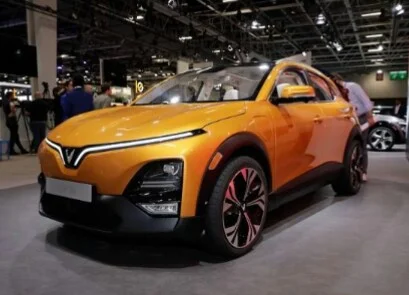Introduction Solid-State Batteries for Electric Vehicle
The world strives towards a more sustainable future, the development of advanced energy storage technologies is crucial.
In recent years, solid-state batteries have emerged as a promising solution with the potential to revolutionize the electric vehicle (EV) industry.
Solid-state batteries offer numerous advantages over traditional lithium-ion batteries, including higher energy density, improved safety, and faster charging capabilities. In this article, we will explore the potential of solid-state batteries and their transformative impact on EV technology.
Solid-State Batteries for Electric Vehicles
| Feature | Solid-State Batteries | Lithium-Ion Batteries |
|---|---|---|
| Energy Density | Higher energy density, allowing for longer driving ranges on a single charge. | Lower energy density compared to solid-state batteries. |
| Safety | Safer due to the use of solid electrolytes, reducing the risk of fire or thermal runaway. | Potential for thermal runaway and battery fires, especially under certain conditions. |
| Charging Speed | Faster charging times due to improved ion movement in solid electrolytes. | Slower charging times, especially for larger battery packs. |
| Lifespan | Longer lifespan with fewer degradation cycles, extending the overall battery life. | Shorter lifespan with more degradation cycles over time. |
| Cost | Higher manufacturing costs due to the complexity of solid-state battery technology. | Lower manufacturing costs compared to solid-state batteries. |
| Development Status | Still in development, with commercialization expected in the coming years. | Widely used in various applications, including electric vehicles. |
| Environmental Impact | Potential for reduced environmental impact due to the use of safer materials and improved energy efficiency. | Environmental concerns related to the mining of lithium and other battery materials. |
Explore Solid-State Batteries For Electric Vehicle
Definition Solid-State Batteries
Solid-state batteries are an advanced class of energy storage devices that utilize solid-state electrolytes instead of liquid or gel-based electrolytes typically found in conventional batteries.
In these batteries, both the positive and negative electrodes, along with the electrolyte, are composed of solid materials. The solid-state electrolyte facilitates the movement of ions between the electrodes during charging and discharging processes.
This unique design offers several advantages over traditional batteries, such as enhanced safety due to the absence of flammable liquid electrolytes, higher energy density for increased storage capacity, and the potential for faster charging times.
Additionally, solid-state batteries are known for their wide operating temperature range, longer lifespan, and improved performance under extreme conditions, making them a promising solution for various applications, including electric vehicles, consumer electronics, and renewable energy systems.
The development and commercialization of solid-state batteries are still ongoing, and researchers are continually exploring new materials and manufacturing techniques to overcome challenges like scalability and cost-effectiveness. As this technology continues to mature, solid-state batteries hold the potential to revolutionize the energy storage landscape, providing safer, more efficient, and environmentally friendly alternatives to traditional battery technologies.
The Power of Solid-State Batteries
Solid-state batteries represent a significant leap forward in energy storage technology. Unlike conventional lithium-ion batteries, which use liquid electrolytes, solid-state batteries employ solid electrolytes.
This design allows for higher energy density, meaning more energy can be stored in the same physical space. With higher energy density, solid-state batteries can offer increased range for electric vehicles, making them more practical and competitive with internal combustion engine vehicles.
Enhanced Safety
Safety is a critical consideration in battery technology, and solid-state batteries address many of the safety concerns associated with liquid electrolyte-based systems.
The use of solid electrolytes eliminates the risk of leakage and thermal runaway, reducing the chances of fire or explosion. Solid-state batteries are inherently more stable, making them a safer choice for electric vehicles and other applications that require high energy storage with minimal safety risks.
Faster Charging Speeds
One of the most significant advantages of solid-state batteries is their ability to charge at much faster rates compared to traditional lithium-ion batteries. The solid-state design enables efficient ion movement, reducing the time required for charging.
This breakthrough has the potential to alleviate "range anxiety" and significantly improve the convenience of electric vehicle ownership. With faster charging speeds, solid-state batteries bring EVs closer to the refueling experience of conventional vehicles, making electric transportation even more appealing and accessible.
Longevity and Durability
Solid-state batteries offer improved longevity and durability compared to their lithium-ion counterparts. The solid electrolyte composition is less susceptible to degradation, resulting in a longer lifespan for the battery.
This extended lifespan reduces the frequency of battery replacements and contributes to the overall sustainability of electric vehicles. With solid-state batteries, EV owners can enjoy longer-lasting energy storage solutions, maximizing the value and efficiency of their vehicles.
Pushing the Boundaries of Innovation
The development of solid-state batteries is driving innovation across the electric vehicle industry. Major automakers and battery manufacturers are investing significant resources in research and development to unlock the full potential of solid-state technology.
The pursuit of solid-state batteries has also led to advancements in manufacturing processes, materials science, and battery management systems. These advancements not only benefit the electric vehicle market but also have applications in other sectors, such as consumer electronics and renewable energy storage.
Solid-State Batteries For Electric Vehicle Technology
There were several types of solid-state batteries being researched and developed for electric vehicle (EV) technology. These solid-state batteries differ in their choice of solid-state electrolyte material, and each type offers unique advantages and challenges.
Here are some of the common types:
1. Lithium Phosphate Solid-State Batteries: These batteries use a solid-state electrolyte made of lithium phosphate compounds. Lithium phosphates are known for their stability and safety, making them a promising option for EV applications. However, their lower ionic conductivity can be a challenge for achieving high power output.
2. Lithium Sulfide Solid-State Batteries: Lithium sulfide-based solid-state electrolytes have shown potential for high lithium-ion conductivity. These batteries may offer higher energy densities and faster charging rates than traditional lithium-ion batteries. However, issues with electrode-electrolyte interface compatibility and stability need to be addressed.
3. Garnet-Type Solid-State Batteries: Garnet materials, such as lithium lanthanum zirconium oxide (LLZO), have attracted significant attention for their excellent lithium-ion conductivity and chemical stability. Garnet-type solid-state batteries could offer high safety levels, wide operating temperatures, and long lifespans. Researchers are actively working on improving their interface compatibility and scalability.
4. Polymer-Based Solid-State Batteries: Some solid-state batteries use polymer electrolytes, which offer advantages such as flexibility, ease of processing, and potential cost savings in manufacturing. However, achieving sufficient ionic conductivity in polymer-based solid-state batteries remains a challenge.
5. Oxide-Based Solid-State Batteries: Batteries using oxide-based solid-state electrolytes have shown promise due to their thermal stability and high ionic conductivity. These materials could enable safer and more reliable batteries for EVs.
Development of solid-state batteries is an ongoing and rapidly evolving field. Researchers and companies continue to explore new materials and approaches to improve the performance, safety, and scalability of solid-state batteries for electric vehicles.
Conclusion Solid-State Batteries for Electric Vehicle
Solid-state batteries are poised to revolutionize electric vehicle technology, offering higher energy density, enhanced safety, faster charging speeds, and improved durability.
The potential of solid-state batteries extends beyond electric vehicles, with implications for various industries and energy storage applications.
Research and development efforts continue, we can expect to witness further breakthroughs that will shape the future of energy storage. Solid-state batteries represent a significant step towards a sustainable and electrically powered transportation system, bringing us closer to a cleaner, greener, and more efficient future.



